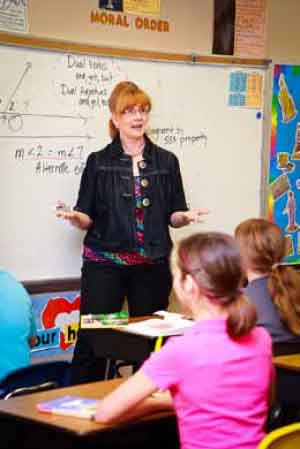Challenging Students to Challenge the Culture

by Sarah Duch
After teaching in public schools and then homeschooling for 15 years, Debbie Mathias found her place in private school education. She now focuses on producing lifelong learners at Trinity Christian School, where she challenges her students to think critically and question their culture.
“I want my students to be able to think on a level that makes them challenge their culture when the culture isn’t thinking,” Mathias said.
Mathias says that her teaching philosophy was crafted during her years homeschooling. Through attending conferences, listening to presentations, and evaluating curriculum publishers, she was able to discover what works best for her teaching style.
Although she describes her temperament as “laid back,” she describes her classroom as “intense,” and she believes that participation is what promotes real learning.
“My goal is to challenge students without overwhelming them,” she said. “We typically hit the ground running when the bell rings, and sometimes learning is just plain noisy! If I have a classroom full of 5th graders coming up with a rap to help them remember something, hilarity and high decibels reign.”
Mathias gains her students’ respect by providing a classroom environment where students feel loved, accepted and safe. She believes that by loving a student, she has already won that student over. Time is never wasted in her classroom, and she believes her students respect that as well.
“There is always work to be done, and this actually makes the class period go by quickly,” Mathias said. “Students appreciate the variety of teaching methods used in my classroom. They like being a little surprised about what they encounter in the classroom.”
One of Mathias’ favorite parts of Trinity Christian School is the school’s role in helping give students a Biblical worldview. Some of her classes discuss issues of morality and relationships, and she believes that students love having someone who is willing to tastefully and honestly give them a Biblical perspective on those issues.
“If we can teach students to think Biblically about the existence and character of God, about truth and morality, about life’s ultimate purpose, about society, science, law, etc., then they can impact and influence their culture in ways that make communities, families and churches function in a healthy way,” she said.
Whether it be music, math, or morality issues, Mathias’ goal is for kids to participate as much as possible in the learning process. She works to give her students the tools to remember her teachings for a lifetime, and sticks to the philosophy that “he who does the most work, is doing the most learning.”









